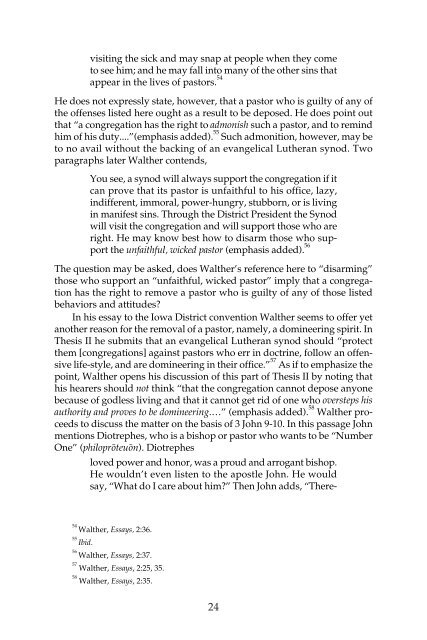45930 Divine Call CTCR final - The Lutheran Church—Missouri Synod
45930 Divine Call CTCR final - The Lutheran Church—Missouri Synod
45930 Divine Call CTCR final - The Lutheran Church—Missouri Synod
Create successful ePaper yourself
Turn your PDF publications into a flip-book with our unique Google optimized e-Paper software.
visiting the sick and may snap at people when they come<br />
to see him; and he may fall into many of the other sins that<br />
appear in the lives of pastors. 54<br />
He does not expressly state, however, that a pastor who is guilty of any of<br />
the offenses listed here ought as a result to be deposed. He does point out<br />
that “a congregation has the right to admonish such a pastor, and to remind<br />
him of his duty....”(emphasis added). 55 Such admonition, however, may be<br />
to no avail without the backing of an evangelical <strong>Lutheran</strong> synod. Two<br />
paragraphs later Walther contends,<br />
You see, a synod will always support the congregation if it<br />
can prove that its pastor is unfaithful to his office, lazy,<br />
indifferent, immoral, power-hungry, stubborn, or is living<br />
in manifest sins. Through the District President the <strong>Synod</strong><br />
will visit the congregation and will support those who are<br />
right. He may know best how to disarm those who support<br />
the unfaithful, wicked pastor (emphasis added). 56<br />
<strong>The</strong> question may be asked, does Walther’s reference here to “disarming”<br />
those who support an “unfaithful, wicked pastor” imply that a congregation<br />
has the right to remove a pastor who is guilty of any of those listed<br />
behaviors and attitudes?<br />
In his essay to the Iowa District convention Walther seems to offer yet<br />
another reason for the removal of a pastor, namely, a domineering spirit. In<br />
<strong>The</strong>sis II he submits that an evangelical <strong>Lutheran</strong> synod should “protect<br />
them [congregations] against pastors who err in doctrine, follow an offensive<br />
life-style, and are domineering in their office.” 57 As if to emphasize the<br />
point, Walther opens his discussion of this part of <strong>The</strong>sis II by noting that<br />
his hearers should not think “that the congregation cannot depose anyone<br />
because of godless living and that it cannot get rid of one who oversteps his<br />
authority and proves to be domineering.…” (emphasis added). 58 Walther proceeds<br />
to discuss the matter on the basis of 3 John 9-10. In this passage John<br />
mentions Diotrephes, who is a bishop or pastor who wants to be “Number<br />
One” (philoprōteuōn). Diotrephes<br />
loved power and honor, was a proud and arrogant bishop.<br />
He wouldn’t even listen to the apostle John. He would<br />
say, “What do I care about him?” <strong>The</strong>n John adds, “<strong>The</strong>re-<br />
54<br />
Walther, Essays, 2:36.<br />
55<br />
Ibid.<br />
56<br />
Walther, Essays, 2:37.<br />
57<br />
Walther, Essays, 2:25, 35.<br />
58<br />
Walther, Essays, 2:35.<br />
24


